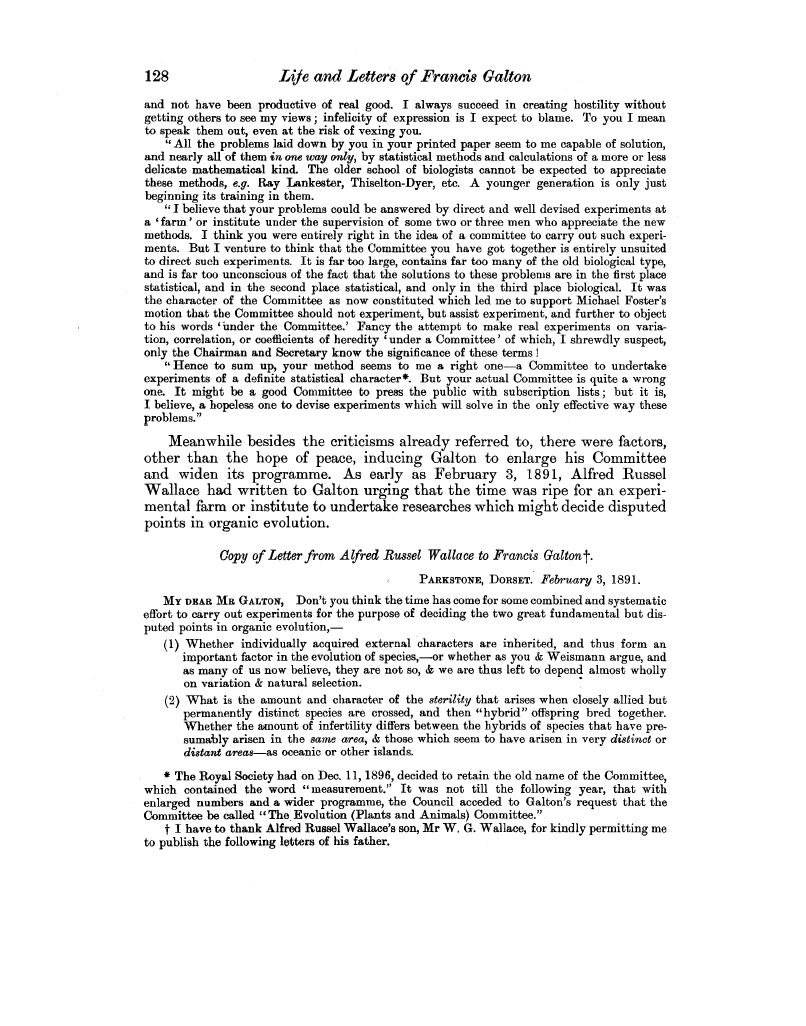| ||||||

OCR Rendition - approximate
128 Life and Letters of Francis Galton and not have been productive of real good. I always succeed in creating hostility without getting others to see my views ; infelicity of expression is I expect to blame. To you I mean to speak them out, even at the risk of vexing you. All the problems laid down by you in your printed paper seem to me capable of solution, and nearly all of them in one way only, by statistical methods and calculations of a more or less delicate mathematical kind. The older school of biologists cannot be expected to appreciate these methods, e.g. Ray Iankester, Thiselton-Dyer, etc. A younger generation is only just beginning its training in them. " I believe that your problems could be answered by direct and well devised experiments at a ' farm' or institute under the supervision of some two or three men who appreciate the new methods. I think you were entirely right in the idea of a committee to carry out such experiments. But I venture to think that the Committee you have got together is entirely unsuited to direct such experiments. It is far too large, contains far too many of the old biological type, and is far too unconscious of the fact that the solutions to these problems are in the first place statistical, and in the second place statistical, and only in the third place biological. It was the character of the Committee as now constituted which led me to support Michael Foster's motion that the Committee should not experiment, but assist experiment, and further to object to his words `under the Committee.' Fancy the attempt to make real experiments on variation, correlation, or coefficients of heredity `under a Committee' of which, I shrewdly suspect, only the Chairman and Secretary know the significance of these terms ! '. Hence to sum up, your method seems to me a right one-a Committee to undertake experiments of a definite statistical character*. But your actual Committee is quite a wrong one. It might be a good Committee to press the public with subscription lists ; but it is, I believe, a hopeless one to devise experiments which will solve in the only effective way these problems." Meanwhile besides the criticisms already referred to, there were factors, other than the hope of peace, inducing Galton to enlarge his Committee and widen its programme. As early as February 3, 1891, Alfred Russel Wallace had written to Galton urging that the time was ripe for an experimental farm or institute to undertake researches which might decide disputed points inorganic evolution. Copy of Letter from Alfred Russel Wallace to Francis Galtont. PARKSTONE, DORSET. February 3, 1891. MY DEAR Ma GALTON, Don't you think the time has come for some combined and systematic effort to carry out experiments for the purpose of deciding the two great fundamental but disputed points in organic evolution, (1) Whether individually acquired external characters are inherited, and thus form an important factor in the evolution of species,-or whether as you & Weismann argue, and as many of us now believe, they are not so, & we are thus left to depend almost wholly on variation & natural selection. (2) What is the amount and character of the sterility that arises when closely allied but permanently distinct species are crossed, and then "hybrid" offspring bred together. Whether the amount of infertility differs between the hybrids of species that have presumably arisen in the same area, & those which seem to have arisen in very distinct or distant areas-as oceanic or other islands. * The Royal Society had on Dec. 11, 1896, decided to retain the old name of the Committee, which contained the word "measurement." It was not till the following year, that with enlarged numbers and a wider programme, the Council acceded to Galton's request that the Committee be called "The. Evolution (Plants and Animals) Committee." t I have to thank Alfred Russel Wallace's son, Mr W. G. Wallace, for kindly permitting me to publish the following letters of his father.
|